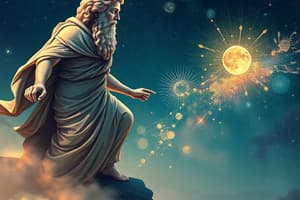Podcast
Questions and Answers
For Aristotle, everything in nature seeks to realize its ______ and finally realize its actualities.
For Aristotle, everything in nature seeks to realize its ______ and finally realize its actualities.
potentialities
Aristotle called the process of realizing one's potential ______, a Greek word for 'to become its essence'.
Aristotle called the process of realizing one's potential ______, a Greek word for 'to become its essence'.
entelechy
Aristotle analyzed the notion of ______ since space and time are infinitely indivisible.
Aristotle analyzed the notion of ______ since space and time are infinitely indivisible.
infinity
For the world of ______ things to exist at all, there must first be something actual.
For the world of ______ things to exist at all, there must first be something actual.
Aristotle divided everything in the natural world into two main categories: ______ things and living things.
Aristotle divided everything in the natural world into two main categories: ______ things and living things.
Nonliving things such as rock, water, and earth have no ______ for change.
Nonliving things such as rock, water, and earth have no ______ for change.
A child strives to be an ______; a seed strives to be a tree.
A child strives to be an ______; a seed strives to be a tree.
Knowledge, however, can be attained (if at all) after ______.
Knowledge, however, can be attained (if at all) after ______.
Nature not only has a built-in ______, but also different levels of being.
Nature not only has a built-in ______, but also different levels of being.
Aristotle's account of change calls upon ______ and potentiality.
Aristotle's account of change calls upon ______ and potentiality.
Flashcards are hidden until you start studying




